7 Volumes
Revolutionary War Era
The shot heard 'round the world.
Constitutional Era
American history between the Revolution and the approach of the Civil War, was dominated by the Constitutional Convention in Philadelphia in 1787. Background rumbling was from the French Revolution. The War of 1812 was merely an embarrassment.
Invaders of Pennsylvania
For a peaceful state, Pennsylvania has suffered many invasions. It's all been one-way; Pennsylvania has never invaded anyone else.
Colonial Times
More than half of American history took place before 1776, but after 1492. For Philadelphia, Colonial history lasted about a century.
Philadephia: America's Capital, 1774-1800
The Continental Congress met in Philadelphia from 1774 to 1788. Next, the new republic had its capital here from 1790 to 1800. Thoroughly Quaker Philadelphia was in the center of the founding twenty-five years when, and where, the enduring political institutions of America emerged.
History: Philadelphia and the Quaker Colonies
Philadelphia and the Quaker Colonies
Quaker Philadelphia 1683-1776
New volume 2012-11-21 17:33:18 description
Connecticut Invades Pennsylvania!
Connecticut once waged three serious wars with Pennsylvania, and we don't even remember it. But politicians noticed that all became peaceful after we united into a single nation. Others noticed the Articles of Confederation were strong enough to cope with invasions by neighbor states. The two proprietorships of New Jersey taught some smaller lessons. Virginia taught still other lessons.

The Origin of States Rights, a Rumination
ALMOST alone among the British colonies in America, Pennsylvania's western border was specified in the King's charter of the colony. It was "five degrees longitude west of the point where the eastern boundary crosses the Delaware" [River]; however, its actual location on the ground was not actually marked until 1784. It's a few miles west of the present city of Pittsburgh, located at the forks of the Ohio River, where the Allegheny and Monongahela Rivers join. However, until 1784 it was not a certainty that this complex was within Pennsylvania instead of Virginia. The origin of Ohio is at the only major water gap in the North-South mountains, and the tributary rivers are fairly large. The three merging rivers thus form a nearly continuous water route along the base of the mountain range, from the Great Lakes south to Pittsburgh, or from the Chesapeake Bay north to Pittsburgh, and then to the Mississippi, going past the best topsoil farming land in the world. The forks of Ohio were the great prize of the Seventeenth and Eighteenth centuries, the place where young George Washington himself started the French and Indian War. To include these treasures, it seems vaguely possible that William Penn insisted on having the border of his state safely include the water gap at the beginning of Ohio. Perhaps not, of course, perhaps it was just a sense of tidiness on the part of the ministers of Charles II. The original document stated that the border was a hundred miles east of there, to match where Maryland ended. When the document was returned to Penn by the King's ministers, however, it had the new language.
The existence of this north-south termination of Pennsylvania began to take on a new significance when other states made claims for their land grant to extend to the Pacific Ocean, and the extensions collided with each other. Virginia then developed its territory to include modern Kentucky and West Virginia. That resulted in Virginia's land aspirations veering northward, to include the Ohio Territory west of Pennsylvania's fixed boundary. By the legal standards of the day, Virginia had a fairly good claim to all of the Indian territories, not merely to the west of Pennsylvania, but extending at least to the Great Lakes, perhaps farther. Maryland, Connecticut, New York, and Massachusetts had conflicting claims from an infinite extension of their western boundaries. As a consequence, it was impossible to achieve ratification of the Articles of Confederation for five years. The various states involved were fearful of the creation of a combined political entity might result in a court which would be enabled to rule against their individual aspirations. The stakes were high; the land mass involved would be several times as large as England.
The person who finally broke this deadlock might well have been Robert Morris, who was disturbed that this inter-state dissension was injuring his ability to borrow foreign funds for the Revolutionary War. The internal negotiations took place under wartime conditions, and are poorly researched. No doubt some person deserves credit for bringing this wrangle to a close. Virginia had the strongest claim, New York the weakest. New York gave up its claim first, Maryland was the last, and Virginia the most disappointed. Pennsylvania, unable to make a claim, took the position that the land belonged to everyone, and eventually was mollified by getting a small notch of land extending to the Great Lakes at Erie. It must be noticed in passing that final resolution of the land claims came at the Treaty of Paris ending the Revolution. Benjamin Franklin, soon to become President of Pennsylvania, was the negotiator of the treaty which reflected Pennsylvania's position that the land belonged to all of us, right?
Even without these western land claims, Virginia was the largest and richest of the colonies, and rather easily adopted the attitude that Virginia would be the leader of the new United States. From their viewpoint, the preservation of states rights would enhance Virginia's leading the country. More or less immediately, the attitude of small states like Delaware hardened into resistance that this must not happen. Much otherwise inexplicable behavior also begins to make a sort of sense: the perverse behavior of the Lee family in the Continental Congress, the quarrels within George Washington's cabinet, the relocation of the capital and the dreams of the Potomac as the nation's main portal of transportation, the rise of Jefferson's political party, the obstructionist behavior of Patrick Henry, the Virginia domination of the Presidency for decades, and countless less famous episodes of history -- make more sense as residuals of Virginia's early land aspirations, than as defenses of slavery or philosophical convictions that states were somehow superior to nations. These suspicions are difficult to clarify and impossible to prove. The best way to see some substance to them is to imagine yourself in the Virginia House of Burgesses, politically connected and vigorous, able to imagine your descendants all inheriting a county or two of rich land as a remote consequence of a few glamorous deeds by their Cavalier ancestor.
Designing the Convention
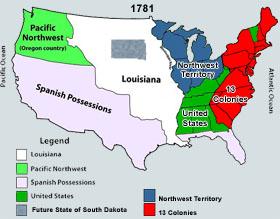
|
| The Convention and the Continent |
THE prevailing notion of the Constitutional Convention once depicted James Madison as seized with the idea of a merger of former colonies into a nation, subsequently selling that concept to George Washington. The General, by this account, was known to be humiliated by the way the Continental Congress mistreated his troops with worthless pay. But recent scholarship emphasizes that Washington noticed Madison in Congress becoming impassioned for raising taxes to pay the troops, was pleased, and reached out to the younger man as his agent. Madison seemed a skillful legislator; many other patriots had been disappointed with the government they had sacrificed to create, but Madison actually led protests within Congress itself. A full generation younger than the General and not at all charismatic, Madison's political effectiveness particularly attracted Washington's attention to him as a skillful manager of committees and legislatures. Washington was upset by Shay's Rebellion in western Massachusetts, which threatened to topple the Massachusetts government, but Shay's frontier disorder was only one example of general restlessness. There was a long background of repeated Indian rebellions in the southern region between Tennessee and Florida, coupled with uneasiness about what France and England were still planning to do to each other in North America. It looked to Washington as though the Articles of Confederation had left the new nation unable to maintain order along thousands of miles of the western frontier. The British clearly seemed reluctant to give up their frontier forts as agreed by the Treaty of Paris, and very likely they were arming and agitating their former Indian allies. Innately rebellious Scotch-Irish, the dominant new settlers of the frontier, were threatening to set up their own government if the American one was too feeble to defend them from the Indians. The Indians for their part were coming to recognize that the former colonies were too weak to keep their promises. With the American Army scattered and nursing its grievances, the sacrifices of eight years of war looked to be in peril.
 The Union is much older than the Constitution. It was formed, in fact, by the Articles of Association in 1774. It was matured and continued by the Declaration of Independence in 1776. It was further matured ... by the Articles of Confederation in 1778. And finally, in 1787, one of the declared objects for ordaining and establishing the Constitution was "to form a more perfect Union. 
|
| A.Lincoln, First Inaugural |
Even Washington's loyal friends were getting out of hand; Alexander Hamilton and Robert Morris had cooked up the Newburgh cabal, hoping to provoke a military coup -- and a monarchy. Because they surely wanted Washington to be the new King, he could not exactly hate them for it. But it was not at all what he had in mind, and they were too prominent to be ignored. So he had to turn away from his closest advisers toward someone of ability but less stature and thus more likely to be obedient. It alarmed Washington that republican government might be discredited, leaving only a choice between a King and anarchy. Particularly when he reviewed shabby behavior becoming characteristic of state legislatures, something had to be done about a system which proclaimed states to be the ultimate source of sovereignty. Washington decided to get matters started, using Madison as his agent. If things went badly he could save his own prestige for other proposals, and Madison could scarcely defy him as Hamilton surely would. Washington could not afford to lose the support of the two Morrises, and still, expect to accomplish anything major. Madison had been to college and could fill in some of the details; Washington merely knew he wanted a stable government and he did not, he definitely did not, want a king. Many have since asked why he renounced being King so violently; it seems likely he was projecting a public rejection of the Hamilton/Morris concept in a way that did not attack them for proposing it. It was a somewhat awkward maneuver, and to some degree, it backfired and trapped him. But Madison proved a good choice for the role, and things worked out reasonably well for the first few years.
 The powers delegated by the proposed Constitution to the Federal Government are few and defined. Those which are to remain in the State Governments are numerous and indefinite. 
|
| J.Madison, Federalist#45 |
Madison was young, vigorous and effective; he held the widespread perception of the Articles of Confederation as the source of the difficulty, and he was a reasonably close neighbor. He was active in Virginia politics at a time when Virginia held defensible claims to what would eventually become nine states. Negotiations for the Northwest Ordinance of 1787 would be going on while the Constitutional Convention was in session, and Virginia was central to both discussions. After conversations at Mount Vernon, a plan was devised and put into action. Washington wanted a central government, strong enough to energize the new nation, but stopping short of a monarchy or military dictatorship. There were other things to expect from a good central government, but it was not initially useful to provoke quarrels. Madison had read many books, knew about details. Between them, these two friendly schemers narrowly convinced the country to go along. As things turned out, issues set aside for later eventually destroyed the friendship between Washington and Madison. Worse still, after seventy years the poorly resolved conflict between national unity and local independence provoked a civil war. Even for a century after that, periodic re-argument of which powers needed to revert to the states, which ones needed to migrate further toward central control, continued to roil a deliberately divided governance.
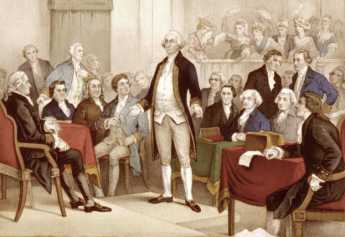
|
| Constitutional Convention |
For immediate purposes, the central problem for the Virginia collaborators was to persuade thirteen state legislatures to give up power for the common good. The Articles of Confederation required unanimous consent of the states for amendment. To pay lip-service to this obstacle, it would be useful to convene a small Constitutional Convention of newly-selected but eminent delegates, rather than face dozens of amendments tip-toeing through the Articles of Confederation, avoiding innumerable traps set by the more numerous Legislatures. In writing the Articles of Confederation, John Dickinson had been a loyal, skillful lawyer acting for his clients. They said Make it Perpetual, and he nearly succeeded. The chosen approach to modification was first to empower eminent leaders without political ambitions and thus, more willing to consent to the loss of power at a local level. Eventual ratification of the final result by the legislatures was definitely unavoidable, but to seek that consent at the end of a process was far preferable because the conciliations could be offered alongside the bitter pills. Divided and quarrelsome states would be at a disadvantage in resisting a finished document which had already anticipated and defused legitimate objections and was the handiwork of a blue-ribbon convention of prominent citizens and heroes. By this strategy, Washington and Madison took advantage of the sad fact that legislatures revert toward mediocrity, as eminent citizens experience its monotonous routine and decline to participate further in it, but will make the required effort for briefly glamorous adventures. Eminently successful citizens are somewhat over-qualified for the job, whose difficulties lesser time-servers are therefore motivated to exaggerate. To use modern parlance, framing the debate sometimes requires changing the debaters. In fact, although he had mainly initiated the movement, Washington refused to participate or endorse it publicly until he was confident the convention would be composed of the most prominent men of the nation. This venture had to be successful, or else he would save his prestige for something with more promise. Making it all work was a task for Madison and Hamilton, who would be replaced if it failed.
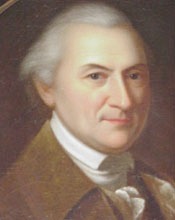
|
| John Dickinson |
While details were better left hazy, the broad outline of a new proposal had to appeal to almost everyone. Since the new Constitution was intended to shift power from the states to the national government, it was vital for voting power in the national legislature to reflect districts of equal population size, selected directly by popular elections. That was what the Articles of Confederation prescribed. But no appointments by state legislatures, please. In the convention, it became evident that small states would fear being controlled by large ones through almost any arrangement at all. On the other hand, small states were particularly anxious to be defended by a strong national army and navy, which requires a large population size. England, France, and Spain were stated to be the main fear, but small states feared big neighboring states, too. Since the Constitutional convention voted as states, small states were already in the strongest voting position they could ever expect, particularly since the Federalists at the convention needed their votes. Eventually, the agreement was found for the bicameral compromise suggested by John Dickinson of Delaware, which consisted of a Senate selected and presumably voting as states, and a House of Representatives elected in proportion to population; with all bills requiring the concurrence of both houses. From the perspective of two centuries later, we can see that allowing state legislatures to redraw congressional districts gives them the power to "Gerrymander" their election outcomes and hence restores to the populous states some of the internal Congressional power Washington and Madison were trying to take away from them. In the 21st Century, New Jersey is an example among a number of states where it can fairly be said that the decennial redistricting of congressional borders accurately predicts the congressional elections for the following ten years. The congressional seniority system then solidifies the power of local political machines over the core of Congressional politics. However, the irony emerges that Gerrymandering is impossible in the Senate, and hence legislature control over their U.S. Senators has been weak ever since the 17th Amendment established senatorial election by popular vote. That's eventually the opposite of the result originally conceded by the Constitutional Convention, but possibly in accord with the wishes of the Federalists who dominated it.

|
| Electoral College Method for Election of the President |
This evolving arrangement of the national legislative bodies seemed in 1787 an improvement over the system for state legislatures because the Federalists believed larger legislatures would contain less corruption because they had more competing for special interests to complain about it. There were skeptics then as now, who wished to weaken the tyranny of the majority so evident in the large states and in the British parliament. To satisfy them, power was redistributed to the executive and judicial branches, which were intentionally selected differently. Here arises the source of the Electoral College for the election of the President. It gives greater weight to small states (and provokes a ruckus among large states whenever the national popular vote is close). Further balance in the bargaining was sought by lifetime appointments to the Judiciary, following selection by the President with the concurrence of the Senate. Without any anticipation in this early bargaining, an unexpectedly large executive bureaucracy promptly flourished under the control of the chief executive, lacking the republicanism so fervently sought by the founders everywhere else. This may be in harmony with the Federalist goal of removing patronage from legislature control, but Appropriations Committee chairmen have since found unofficial ways to assert pressure on the bureaucracy. It's quite an unbalanced expedient. Only in the case of the Defense Department is the balancing will of the Constitutional Convention made clear: the President is commander in chief, only Congress can declare war. Although this difficult process was meant to discourage wars, it mainly discouraged the declaration of wars; other evasions emerged. From placing the command under an elected President, emerges a stronger implicit emphasis on civilian control of the military, loosely linked to the fairly meaningless legislative approval of initiating warfare. There have been more armed conflicts than "declarations" of war, but no one can say how many there might otherwise have been. And there have been no examples of a Congress rejecting a President's urging for war.
And that's about it for what we might call the first phase of the Constitution or the Articles. In 1787 there arose a prevalent feeling that national laws should pre-empt state laws. In view of the need to get state legislatures to ratify the document however, this was withdrawn. The Constitution was designed to take as much power away from the states as could be taken without provoking them into refusing to ratify it. Since ratification did barely squeak through after huge exertions by the Federalists, the Constitution closely approaches the tolerable limit, and cannot be criticized for going any further. Since no other voluntary federation has gone even this far in the subsequent two hundred years, the margin between what is workable and what is achievable must be very narrow. Notice, however, the considerable difference between Congress having the power to overrule any state law, and declaring that any state law which conflicts with Federal law is invalid.
The details of this government structure were spelled out in detail in Sections I through IV. However, just to be sure, Section VI sums it all up in trenchant prose:
This Constitution, and the laws of the United States which shall be made in pursuance thereof; and all treaties made, or which shall be made, under the authority of the United States, shall be the supreme law of the land; and the judges in every state shall be bound thereby, anything in the Constitution or laws of any State to the contrary notwithstanding. The Senators and Representatives before mentioned, and the members of the several state legislatures, and all executive and judicial officers, both of the United States and of the several states, shall be bound by oath or affirmation, to support this Constitution; but no religious test shall ever be required as a qualification to any office or public trust under the United States.
Except for some housekeeping details, the structural Constitution ends here and can still be admired as sparse and concise. That final phrase about religious tests for office sounds like a strange afterthought, but in fact, its position and lack of any possible ambiguity serve to remind the nation of grim experience that only religion has caused more problems than factionalism. Madison was particularly strong on this point, having in mind the undue influence the Anglican Church exerted as the established religion of Virginia. There are no qualifications; religion is not to have any part of government power or policy. By tradition, symbolism has not been prohibited. But government as an extension of religion is emphatically excluded, as is religion as an agency of government. Many failures of governments, past and present, can be traced to an irresolution to summon up this degree of emphasis about a principle too absolute to tolerate wordiness.
Articles of Confederation: Flaws
DURING the twenty-five years (1776-1801) government was in Philadelphia, Americans who had rebelled against tight royal rule uncovered many defects in its opposite -- a loose association of states. Loose associations only preserve fairness by operating with unanimous consent, which is, of course, unfair to a thwarted majority, unless a dissenting minority thwarts itself as a gesture of kindness. The Founding Fathers ultimately devised a formula of weakening power by dividing it into layers -- national, state, county, municipal -- and seeking to confine minority dissent to the weakest political unit. Persuasion and peer pressure were given time to work up the ladder of appeal to a wider, more powerful body of citizens. Bottom upward by choice; top-down only in desperation. Furthermore, persuasion first, force as last resort. An implicit third safety valve emerged: if a good idea is smothered by a local concentration of bigotry, appealing to a wider population includes being heard by more viewpoints. No one claims to have authored this whole prescription or foreseen its hidden benefits; it apparently evolved by trial and error. There was another latent discovery for America's sparse population in a hostile wilderness: maintaining harmony was more essential than efficiency. It would be hard to consolidate more Quakerly concepts of governance in one document. Not exactly assembled, it emerged and was admired. The local Quaker merchants were living proof that harmony made riches for anyone, while force only works against weaker people. George Washington the cavalier general came to Philadelphia and gave it a softly Virginian twist, over and over: Honesty is the best policy. It seems to have originated in one of Aesop's Fables.
 It is not necessary that the [Constitution] should be perfect; it is sufficient that [the Articles of Confederation are] more imperfect. 
|
| James Madison |
Recently examined documentation reveals James Madison, the main theoretician of the closed-door Constitutional Convention, to have been severely contemptuous of state legislatures at this time in his life, and rather severely defeated by John Dickinson in a political quarrel in mid-convention about the powers of small states. From this fragile evidence emerges the idea that in balancing the powers of state and national governments in the "federal" system, it may have been someone else's idea that the greater freedom to move out of an offending state into a more favorable one, would appreciably restrain state legislative abuses. Even with this feature built into the system with the national government to enforce it, Madison is said to have been in a state of depression that the Convention refused to agree to his idea of giving Congress veto power over state laws. It took some time for improved transportation to strengthen this competition between states, but it may not be an accident that Delaware now leads the way in responding to the implicit opportunity.
Philosophy and history are different. The Framers gradually acknowledged a patched charter of tribal allegiance was insufficient and thus adjusted to the idea of a central government. They tweaked a decentralized model of governance to get the states out of the road, without antagonizing them so much they would not ratify it. Although it is commonplace to say the Articles of Confederation were a weak failure, the Articles did reflect American attitudes at the beginning of our formative period. The Constitution would not have been acceptable if the Articles of Confederation had not first been given a trial. By the end of the 1787 Philadelphia negotiation, the nature of the final proposal was to define a few absolutely minimum powers for a national government, identify a few other powers as destructive when in the hands of any other level of government, and leave a vast undefined area: where new and novel problems would be tried out in the states, then passed to a national level if necessary. Anticipating constant mid-course corrections was an important objective for even a minimalist Constitution, not the least of those challenges was to create ways to keep it minimalist. Simplicity itself keeps it hard to change. Starting at the bottom of the layers of government continues to this day to introduce new and unexpected problems to the "laboratory of the states" or even lower, working upward only as proven necessary, or spread nationally only after the solution is highly successful. It is a legacy of slavery, the Civil War, and direct election of Senators (Amendment XVII) that many Americans still fail to welcome the merits of this approach, or lack the patience to try it for their pet ideas. Considering the Articles of Confederation and the Constitution as two documents with continuous goals, we got it right, the second time.
And we got it right in the environment of Eighteenth-century Quaker Philadelphia, where a tolerant examination of new ideas was more venerated than in any other place in the civilized world. With a combination of wisdom and impasse, minor issues were left to the future. It is true this sometimes creates problems of neglect. But it makes it possible to define those few issues which must never change. An unexpected virtue of minimalism surfaced eighty years later: many men understood it well enough to die for it.
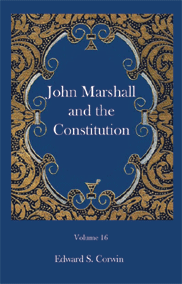
|
|
Edwin Corwin's "John Marshall and the Constitution" |
Much has been written about the separation and balance of powers between the three branches of the federal government. However, the real balance of power in the Constitution in 1787 was vertical, between the central government and the constituent states. Balancing power horizontally, within the central government's branches, is a way of preventing one side of this other argument from tilting the state/federal balance in its own favor, or slowing down the effect of any victories by one side. In other words, it preserved citizen liberty to choose. From this continuing two-dimensional struggle emerges the explanation for filibusters, the seniority system, the confirmation process for Supreme Court and Cabinet appointments. It also calls into question the Seventeenth Amendment, where the state legislatures lost the power to appoint U.S. Senators. In 1786 the states had all the power, in 2009 state power is much diminished; but it is not entirely gone by any means. It is true the cry for states rights, essentially an appeal to the Deity for Justice is futile. If states are to wrest power back from the federal government, it will be by the adroit exercise of powers buried within the balanced powers of the federal branches, but it can succeed if the public ever wants it to succeed. The Framers seem to have overlooked the possibility that federal power could someday outgrow its blood supply, simply growing too big to manage. It is also true the Framers neglected the possibility of a protracted period of disagreement between two halves of the electorate. At least in these particulars, there is room for the further evolution of the Constitutional principle.
While features of the present Constitution can sometimes be linked to the correction of flaws in the Articles, one by one amendment never seemed to be quite enough. Subsequent analysis of Original Intent has often had to contend with the unspoken intent of earlier negotiators to strengthen partisan advantage in later struggles. The political battles being fought at the beginning, which except for slavery are substantially the same today, were sometimes being promoted for reasons which now seem merely quaint. Fine, everyone can agree it was complex. Still, there was a recurring uneasiness: what was the underlying flaw in the Articles? What, as they say, is the take-home point?
One widely accepted summary, probably a correct one, of what was centrally wrong with the Articles of Confederation, lies in a concise observation, which follows, from Edward S. Corwin's book John Marshall and the Constitution:
"The vital defect of the system of government provided by the soon obsolete Articles of Confederation lay in the fact that it operated not upon the individual citizens of the United States but upon the States in their corporate capacities. As a consequence, the prescribed duties of any law passed by Congress in pursuance of powers derived from the Articles of Confederation could not be enforced."
And that's how many Revolutionary Americans, possibly most of them, had wanted to have it. They were in revolt against all strong government, not just the King of England. They surely would have applauded Lord Acton's declaration that "All power tends to corrupt, and absolute power corrupts absolutely." Thirteen years of near-anarchy taught them they must at least give some limited powers to a central government, but it was to be no more than absolutely necessary. For some, the Ulster Scots, in particular, even the absolutely minimum amount was still just a bit too much. In effect, these objectors wanted a democracy, not a republic.
To deconstruct Professor Corwin's analysis somewhat, the equality-driven followers of Thomas Jefferson believed the insurmountable obstacle for uniting sovereign states is that they are sovereign, and won't give it up. The merit-driven followers of Alexander Hamilton, Robert Morris, and George Washington bitterly resisted; in business and in war you need the best leaders to rise to power. The function of common men is to select the best among themselves to be leaders. Only James Madison seems to have grasped that ideal government might tend more toward a republic for purposes of the enumerated federal powers plus enumerated powers specifically denied to the states. For lesser issues, perhaps a purer democracy would be just as workable. However, in operation, it took scarcely a year to discover that the common man would not automatically select the best man he knew to be his representative. In fact, there exists a considerable populist sentiment, that wealth and success outside government are actually disqualifications for office. To some extent, this reverse social Darwinism is grounded in an unwillingness of the upper class to serve in government, perhaps because service to the country interferes with the lifestyle of unrestrained power and wealth which other occupations allow, but is forbidden to public servants. In any event, we persist in the fruitless argument whether America is a democracy or a republic; it was designed to be a mixture of both. Within the time of the first presidency, the unattractive realities of mixing human nature with elective politics transformed the meanings of the Constitutional document to something that was never written there, and other nations have largely failed to grasp. It apparently also worked a major transformation in its main author. James Madison first quarreled with his ally, Alexander Hamilton, and joined forces with the Constitution-doubter Thomas Jefferson. His mentor and idol, George Washington, essentially never spoke to him again.
---------------------------------------------------------------------------------------------------------------
States rights no longer confronts America directly, because the Founding Fathers managed to get around it until the Civil War, and then the Fourteenth Amendment enabled the federal judiciary to attenuate state sovereignty somewhat further without eliminating the architecture of a federation of states. In other words, in two main steps we deprived the states of some sovereignty, but no more than absolutely necessary, and we took more than a century to do it. The European Union currently faces the same obstacle; this is how we solved it. If they can get the same result in some other peaceful way, good luck to them. Our framers used the language "Congress may...or Congress may not..." They only dared to strip state legislature of a few powers because they needed the legislatures to ratify the Constitution, a gun you can only fire once. Thus, they forbade states the right to issue paper money, the power to interfere in private contracts, and such, as enumerated in Article I, Section X, where the operative phrase is "The states are forbidden to..". The framers were willing to strip the unformed Congress of many more specific powers than the all-too-existing states; the Constitution can be read as a proclamation of the powers which any central government simply must possess. There might be other desirable powers, but here is the minimum. After eighty years, individual Southern states asserted their unlimited powers extended to nullification and secession, and because of a perceived need to preserve slavery would not back down. The Constitutional consequence of this national tragedy was the Due Process section of the Fourteenth Amendment, which has since been purported by the Supreme Court to mean that whatever the federal government may not do, the states may not do, either. However, Due Process traces back to the Magna Carta and has been so tormented by an interpretation that for the purpose stated, it is growing somewhat too elusive to remain useful. For historical reasons, we never gave a fair trial to the original proposal to address the federal/state dilemma. The Constitutional Convention was held in confidence, many delegates changed their minds along the way, and many ideas were more perceived than enunciated. It is plausible that the original strategy originated with Madison's teachers and emerged from many discussions, but there were several delegates in attendance with the sophistication to originate it. In a convention of egotists, there were even a few who would put their ideas in someone else's mouth.
The concept of how to curtail power in a non-violent way, can be called Regulatory Competition. Mitt Romney seemingly plans to promote the idea as a central feature of his political run for President of the United States, using a variant he has developed with Glenn Hubbard, the Dean of the Columbia University School of Business. The idea does still work reasonably well with state taxes and corporate regulation. If a state raises a tax, estate tax for example, in a burdensome way, people will flee to a state with more reasonable taxation. Corporations have learned how to shift legal headquarters to Delaware and other states which court them, and in really desperate cases will move factories or whole businesses. There is little doubt this discipline is effective, and little doubt that some cities and states have been punished severely for encouraging an anti-business environment. Whether the Fourteenth Amendment could be cleverly amended to expand this competitive effect without reintroducing segregation or the like, has not been seriously considered, but perhaps it should be. There are however not too many alternatives to consider.
As far as advising our European friends is concerned, it would be important to point out that the original version of Regulatory Competition completely depends for its effectiveness on the freedom to flee to some other state within the union. A common language is a big help to unity, but the ability to move residence is essential, so for practical purposes, both a common language and freedom of migration are required. Underlying such concessions is a sense of tolerance of cultural differences. That is unfortunately where most such proposed unions have either resorted to violence or failed to unite. And of course, the power which might otherwise be abused must then be shifted from the federal, back to a state level. What surfaces is a sort of one-way street? It remains far easier to devolve into little statelets than to unite for the benefits of scale. A working majority under the likes of Thomas Jefferson might have been assembled in the Nineteenth century but was held back by coping with the expanding frontier. During the Twentieth century, it would have been held back by the need to deal with world power. The Second Tea Party seems to have some inclination along these lines, but it remains to be seen whether some overwhelming need for world power will once more overcome the obvious national ambivalence about it.
The revised proposal for the regulatory competition takes the proposal to a different level, possibly a more workable one. Workers in the United States can freely move from one state to another but are restrained by national laws from equally free movement between nations. Removing that barrier makes the European Union attractive, although it inflames local nationalism. Since it seems more palatable to allow the currency to move, perhaps a little tinkering would be sufficient to permit uniform monetary rules to be the hammer which forces nations into permitting free trade on a global scale. The people themselves can remain at home in their national costumes, perhaps perfecting their religions in more churches and language skills in more schools. Meanwhile, the insight of Adam Smith would prevail for the long-term prosperity of everyone. Each party in a transaction feels enriched by it, the seller preferring to have the money, and the buyer preferring to own the goods. Multiplied a trillion-fold, these improvements in everyone's condition result in the steady enrichment of all.
The King's Last and Final Word
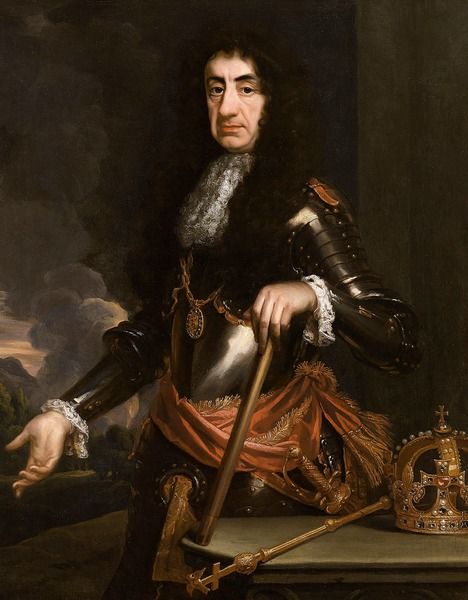
|
| King Charles II |
In 1662, King Charles II of England signed a charter, giving a strip of land in America to the inhabitants of Connecticut, and that land to stretch from the Atlantic Ocean to the Pacific. And then, eighteen years later, the same king signed a second charter, giving much the same land to William Penn. As lawyers say, these are the facts. In the many lawsuits, arguments, and wars which followed, no one ever seriously raised the point that King Charles was unaware that he was giving the same land twice, so it must be assumed he knew exactly what he was doing, and did it on purpose. In fact, he did this sort of thing many times, in other cases. The legal disputes which this double-dealing inspired, are therefore entirely concerned with whether the King had a right to do it, and if so, whether that right would normally be recognized (i.e. durable) when we threw off the King and became a republic. The matter was considered by many courts many times, and in every single case, the judgment was in favor of Pennsylvania.
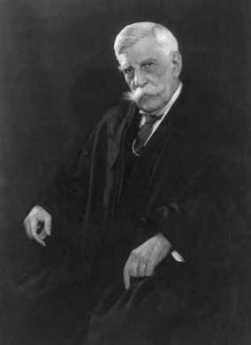
|
| Oliver Wendel Holmes Jr. |
Consider Connecticut's probable attitude toward all this. The colony was settled by Calvinist dissenters, so-called Roundheads for their surprisingly contemporary haircuts, adherents of General Cromwell, executioners of King Charles I during English Civil War. They gave Old Testament first names to their own children, and had always known they couldn't trust that licentious King. Giving their land away after he had promised it to them was just about what they always expected. When, after seventy years of growing families of fifteen to seventeen children, they discovered that Connecticut soil was merely a pile of pebbles left by the glaciers and covered with a thin layer of topsoil, they became even more convinced they had been cheated in the first place, and the bargain was no bargain. The reverse side of this enduring religious hatred will reappear in a few paragraphs.
The Proprietors of Pennsylvania, by this time no longer pacifist Quakers, but while descendants of William Penn, converted Anglicans and great friends with the King, took the matter calmly. The Connecticut lawyers were saying that if you sell or give away some land, it is no longer yours, so you can't give or sell it a second time. That is the modern view perhaps, but the English-speaking world was changing from a feudal, semi-nomadic, culture into a settled agricultural country where fixed boundaries were only starting to be important. That's where the world was going, but at the time King Charles gave away the land, it was far more important for the King to be able to reward successful underlings, and punish rebellious tribes, as the situation warranted. Ownership of land then seemed a nebulous thing at best, and the King was the best judge of how things should be divvied up.
Oliver Wendell Holmes introduced his book on The Common Law, by warning "The life of the law has not been logic, it has been experience." For life to go on and prosperity to endure, some decision must be made and held to, right or wrong. Stare decisis. That's of course fine for judges to say, but it must be observed that when people divide up on this question, where they stand depends heavily on where their ancestors stood on the English Civil War, and where their ancestors happened to be living during the so-called Pennamite Wars. As matters turned out, courts kept deciding in favor of Pennsylvania, and Connecticut kept bringing it up, again.
Pennsylvania Likes Private Property Private
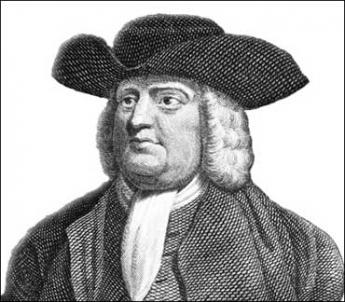
|
| William Penn Holding his Charter |
William Penn was the largest private landowner in America, maybe the whole world. He owned all of Pennsylvania, with the states of Delaware and New Jersey sort of thrown in. Although he and his descendants tried actively to sell off his real estate from 1684 to 1783, they still held an unsold three-fifths of it at the conclusion of the Revolutionary War, which they were forced to sell to the state for about fifteen cents per acre. This bit of history partly explains both the strong feeling this is private, not communal, land despite the existence of 2.3 million acres of the state forest system, which is affirmed right alongside the rather inconsistent feeling that raw land is somehow inexhaustible. Early settlers regarded the center of the state as poor farmland, particularly when compared with soil found in Lancaster and Dauphin Counties, or anticipated by settlers going to Ohio and Southern Illinois. A complimentary description is that glaciers descended to about the middle of Pennsylvania, denuding the northern half of topsoil which was then dumped on the southern part as the glaciers receded. Even today, farmers tend to avoid the northern region if they can, reciting the ancient advice from their fathers that "Only a Mennonite can make a go of it, around there."
So, lumbering had a century-long flurry in Central Pennsylvania, exhausting the trees and moving on. But that only related to the top layer of soil; beneath it lay anthracite in the East, and bituminous coal in Western Pennsylvania, supporting the steel industries of the two ends of the state with exuberant railroad development. Even today worldwide, hauling coal is the chief money-maker for railroads. The resulting availability of rail transport promotes the location of heavy industry near coal regions; the 20th Century decline of coal demand ultimately hurried the decline of heavy industry in the state by impairing the railroads.
Beneath all this lie the aquifers, porous caverns of fresh water. And beneath that, largely unsuspected for two centuries, lie the sedimentary deposits of a huge inland sea, compressed into petroleum which evaporates into natural gas. All of this is held by huge deposits of semi-porous shale rock, now mostly 8000 feet deep, stretching from Canada to Texas and called the Marcellus shale formation. If it can be economically recovered, there is more natural gas than in Arabia, and there is a similar formation along the near side of the Rocky Mountains in Colorado, stretching up to the Athabasca tar sands in Canada. There is another similar formation in France underneath Paris. No doubt, we will find the whole world has similar huge deposits for which the main problem has always been: how do you get it out?
There's another question, of course, of who owns it. Those who clearly do not own it maintain that everyone owns it. In the western world, most particularly in America, it is our firm belief that if you live on top of it, you own it. Since it is expensive to extract, quarrels like this are usually settled by purchasing mineral rights from the surface owner, who generally could not possibly extract it by himself. Those who assert they have a conflicting right to it because it belongs to everyone can expect belligerent resistance. At the present time when America faces a critical fifteen year period of dwindling oil supply, ultimately relieved by perfecting alternative energy sources, there is too little time to achieve consensus for any other governance theory. The problem which could possibly gain enough traction to interfere is the issue of potential damage to others which might result from the extraction of this subsurface treasure. Because of the apparent urgency of a decision to extract or go elsewhere to extract, the best we can hope for is some fairly rough justice.
The Heirs of William Penn
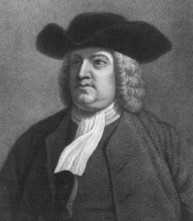
|
| William Penn |
Freedom of religion includes the right to join some other religion than the one your father founded; William Penn's descendants had every right to become members of the Anglican church. It may even have been a wise move for them, in view of their need to maintain good relations with the British Monarch. But religious conversion cost the Penn family the automatic political allegiance of the Quakers dominating their colony. Not much has come down to us showing the Pennsylvania Quakers bitterly resenting their desertion, but it would be remarkable if at least some ardent Quakers did not feel that way. It certainly confuses history students, when they read that the Quakers of Pennsylvania were often rebellious about the rule of the Penn family.
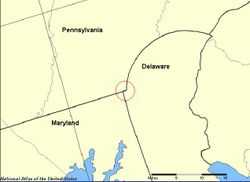
|
| Delaware |
Such resentments probably accelerated but do not completely explain the growing restlessness between the tenants and the landlords. The terms of the Charter gave the Penns ownership of the land from the Delaware River to five degrees west of the river -- providing they could maintain order there. King Charles was happy to be freed of the expense of policing this wilderness, and to be paid for it, to be freed of obligation to Admiral Penn who greatly assisted his return to the throne, and to have a place to be rid of a large number of English Dissenters. The Penns were, in effect, vassal kings of a subkingdom larger than England itself. However, they behaved in what would now be considered an entirely businesslike arrangement. They bought their land, fair and square, purchased it a second or even third time from the local Indians, and refused to permit settlement until the Indians were satisfied. They skillfully negotiated border disputes with their neighbors without resorting to armed force, while employing great skill in the English Court on behalf of the settlers on their land. They provided benign oversight of the influx of huge numbers of settlers from various regions and nations, wisely and shrewdly managing a host of petty problems with the demonstration that peace led to prosperity, and that reasonableness could cope with ignorance and violence. When revolution changed the government and all the rules, they coped with the difficulties as well as anyone in history had done, and better than most. In retrospect, most of the violent criticism they engendered at the time, seems pretty unfair.
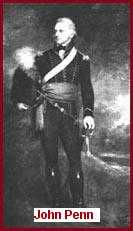
|
| John Penn |
They wanted to sell off their land as fast as they could at a fair price. They did not seek power, and in fact surrendered the right to govern the colony to the purchasers of the first five million acres, in return for being allowed to become private citizens selling off the remaining twenty-five million. Ultimately in 1789, they were forced to accept the sacrifice price of fifteen cents an acre. Aside from a few serious mistakes at the Council of Albany by a rather young John Penn, they treated the settlers honorably and did not deserve the treatment or the epithets they received in return. The main accusation made against them was that they were only interested in selling their land. Their main defense was they were only interested in selling their land.
As time has passed, their reputation has repaired itself, and they bask in the universal gratitude which is directed to their grandfather and father, William Penn. Statues and nameplates abound. Nobody who attacked them at the time appears to have been really serious about it, except one. Except for Benjamin Franklin, who turned from being their close friend to being their bitter enemy. Franklin tried to destroy the Penns, traveled to England to do it, and after twenty years seemed just as bitter as ever. Something really bad happened between them in 1754, and neither the Penns nor Franklin has been open about what it was.
East Jersey's Decline and Fall
The colony of New Caesaria (Jersey) had two provinces, East and West Jersey, because the Stuart kings of England had given the colony to two of their friends, Sir George Carteret and John, Lord Berkeley, to split between them. Both provinces soon fell under the control of William Penn but it took a little longer to acquire the Berkeley part, so the Proprietorship of East Jersey was the oldest corporation in America until it dissolved in 1998.
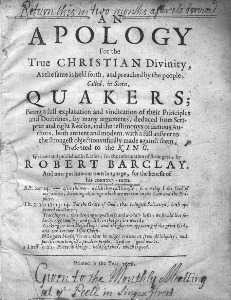 |
| Apology for the True Christian Divinity |
It would appear that Penn intended West Jersey to be a refuge for English Quakers and East Jersey was to be the home of Scots Quakers. Twenty of the original twenty-four proprietors were Quakers, at least half of them Scottish. Early governorship of East Jersey was assumed by Robert Barclay, Laird of Urie, who was certainly Scottish enough for the purpose, and also a famous Quaker theologian. Even today, his Apology for the True Christian Divinity is regarded as the best statement of the original Quaker principles. However, Barclay remained in England, and his deputies proved to be somewhat more Scottish than Quaker. Eighteenth-century Scots were notoriously combative and soon engaged in serious disputes with the local Puritans who had earlier migrated into East Jersey from Connecticut with the encouragement of Carteret. This enclave of aggressive Puritans probably provided the path of migration for the Connecticut settlers who invaded Pennsylvania in the Pennamite Wars, so the hostility between Puritans and Quakers was soon established. The Dutch settlers in the region were also combative, so the eastern province of Penn's peaceful experiment in religious tolerance started off early with considerable unrest. Of these groups, the Scots became dominant, even referring to the region as New Scotland. To look ahead to the time of the Revolution, most of the East Jersey leadership was in the hands of Proprietors of Scottish derivation, with at least the advantage that these were likely to have been very vigilant in seeing Proprietor rights originally conferred by the British King, continue to be honored by the new American republic.
East Jersey was probably already the most diverse place in the colonies when loyalists and revolutionaries took opposite sides in the bitter eight-year war over English rule, with hatred further inflamed when the victors in the Revolution divvied up the properties of loyalists who had fled. The earlier conflict was created by management blunders of the Proprietary leadership itself. Instead of surveying and mapping, before they sold off defined property, like every other real estate development corporation, the East Jersey Proprietors adopted the bizarre practice of selling plots of land first and then telling the purchaser to select its location. In the early years, it is true that good farmland was abundant, but inevitably two or more purchasers would occasionally choose overlapping plots of land. The Proprietors were astonishingly indifferent to the resulting uproar, telling the purchasers that this was their problem. The outcome of all this friction was that settlers petitioned London for relief, and in 1703 Queen Anne took governing powers away from both the East and West proprietorships and unified the two provinces into a single crown colony. The Queen obviously nursed the hope that South Jersey would impose a civilizing influence on the North, but immigration patterns determined a somewhat opposite outcome. Both proprietorships, however, were allowed to continue full ownership rights to any remaining undeeded property.
In later years, the East Jersey Proprietors created more unnecessary problems by attempting to confiscate and re-sell pieces of land whose surveys were faulty, sometimes of a property occupied with houses for as much as fifty years. This East Jersey proprietorship, in short, did not enjoy either a low profile or the same level of benevolent acceptance prevailing in the West Jersey province. A climate of skepticism developed that easily turned any management misjudgment into a confrontation.
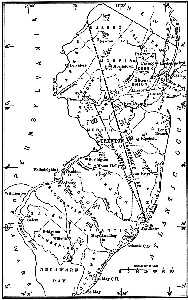
|
| New Jersey Line |
The East Jersey proprietorship operated by taking title to unclaimed land, and then reselling it. In what seemed like a minor difference, the West Jersey group never took title itself, but merely charged a fee for surveying and managing the sale of unclaimed land. The upshot of this distinction was that the East Jersey group got into many lawsuits over disputed ownership, which the West Jersey Proprietorship largely escaped. The nature of unclaimed land in New Jersey is for ocean currents to throw up new islands in the bays between the barrier islands and the mainland, or pile up new swampland along the banks of the Hudson and Delaware Rivers. Such marshy and mosquito-infested land may have little value to a farmer but lately has become highly prized by environmentalists, who supply class-action lawyers with that nebulous legal concept of "standing". The posture of the West Jersey Proprietors is to be happy to survey and convey clear title to a particular property for a fee, but a buyer must come to them with that request. The East Jersey method put its proprietors in repeated conflict over possession and title, with idealists enjoying free legal encouragement from contingent-fee lawyers. By 1998, the Proprietors of East Jersey had endured all they could stand. Selling their remaining rights to the State for a nominal sum, they turned over their historic documents to the state archives. The plaintiff lawyers could sue the state for the swamps if they chose to, but the East Jersey Proprietors had just had enough.
The only clear thing about all of this is that the Proprietors of West Jersey now stand unchallenged as the oldest stockholder corporation in America. It's not certain just what this title is worth, but at least it is awfully hard to improve on it.
Addressing The Proprietors' Dilemma

|
| William Penn |
DURING the century which elapsed after Charles II gave away Pennsylvania to William Penn, several hundred thousand people moved in and changed the place. Transformation of the wilderness explains why the terms of the grant seemed logical at one time, but proved almost impossible to manage at the time of the Revolution. The Penns with thirty million acres was the largest landholders in America but, in fact, by 1776 only five million acres had been sold in a century. The land they held was simply too much for one family to handle without an army, and although the original settlers were pacifists, the later ones were combative.
Charles II had written in the Charter that the Penns could have the land if they could maintain order there, retaining the legal right for the King to recover the land if they didn't. This fall-back provision certainly reflects some doubt about the ability of pacifists to shoot the necessary number of Indians, Frenchmen, and Spaniards. On the other hand, the motive for a King delegating away his authority in the first place became clearer when the Penns experienced severe financial strain defending the Northeast corner of the state against the Connecticut invaders. It furthermore helps us understand why Benjamin Franklin received such a cold reception when he was sent to London by the colonists to request the crown to reassert civil authority over the state. That did not necessarily imply stripping the Penns of their land; by this time, it was clear that the Penn Proprietors were mainly interested in selling it to someone. The charter of the King's grant included the offer to make William Penn a King; and although the offer was declined, the Penn Proprietors retained some degree of legal power to govern the territory. Franklin for all his persuasive power was, unfortunately, the one man Thomas Penn didn't want to see, because of the threat he had posed by raising a militia in King George's War, and later his expansiveness at the Albany Conference. And Thomas was a good friend of the King. The King didn't want these problems and particularly didn't want the expense. Ambiguities were, of course, shared all around. William Penn had quite shrewdly seen it was more sensible to treat the Indians decently than to fight with them, and cheaper too; the lesson was not lost on the British crown. But the French Kings posed a much larger world-wide threat to the British colony, finding for their part, it was rather economical to supply munitions to the Indians on the frontier and stir them up emotionally. The French and Indian War was a small component of the Seven Years War, which proved to be a costly adventure for both sides. Its local cost certainly overwhelmed the ability of one family to underwrite local governance in a large wartime colony, and it jeopardized the finances of the British Monarch to carry the rest. The resulting need to tax the colonies for their defense sent things downhill, eventually to the Stamp Act, the Townshend duties, and the Tea Tax. Everyone made lots of mistakes as the whole structure underwent revision, just as pacifists are certain will happen in any war. But when a pacifist utopian colony was prospering while successfully dealing with the Indians, it's all sort of a big pity.
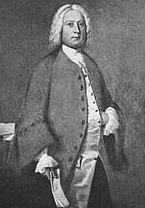
|
| Thomas Penn |
With much to lose, the Penn family did pretty well with the resources at hand. By the time of the Revolution, three generations of Penns had divided up ownership shares of the Proprietorship. When French and Spanish ships were marauding the Delaware River, Benjamin Franklin the local printer took it on himself to organize a militia which persists today as the Pennsylvania National Guard, the Twenty-eighth Division. Franklin was suddenly a local hero to everyone, except to one man, Thomas Penn. Thomas was the dominant figure in the Penn family for many years and worried deeply about Franklin, a man who could stir up ten thousand armed volunteers with a poster proclamation. Such a man could mean trouble, as indeed events later proved to be the case.
John Penn was the Governor of the state, residing in his mansion on the Schuylkill called Lansdowne, doing his best to ingratiate the locals. He struggled to be diplomatic when arguing for the decisions actually made by his Uncle Thomas in London. Thomas Penn, on the other hand, was an important friend of the British Ministry, and a notable person in aristocratic England. As the Revolutionary War approached, the problem transformed into how to hold on to 25 million unsold acres, while remaining unsure who was going to win the impending war.

|
| John Penn |
The strategy the Penns adopted was to get out of the business of running a local government, as Franklin had proposed but in a different way. John Penn the Governor became a private citizen, just a local real estate agent. He took an oath of allegiance to the Revolutionary government, which in the chaos of the time was equivalent to becoming an American citizen. Meanwhile, other members of the family remained in England, ready to revise the arrangement if the British won the war. It was all fairly transparent straddling of the issues, which was only even remotely likely to be effective because of the enormous store of Penn goodwill built up over a century. In 1789 revolutionary France, for example, such sentimentality would not have delayed the tumbrels to the guillotine for five minutes.
Meanwhile, an unexpected difficulty was created. By withdrawing from control of the local government, the Penn family also withdrew from the defense of state borders against neighboring colonies. Under the circumstances, the Penns were afraid to appeal to the King, while the new government of Pennsylvania found the Articles of Confederation were merely a wartime tribal compact. The Articles stabilized boundaries mainly for the purpose of conducting a united war, and did not seriously contemplate a continuing judicial role for disputes between colonies. When the Revolution was finally over, the Penn Proprietors were not left with much of a bargaining position. The new State of Pennsylvania offered, and they accepted, about fifteen cents an acre to surrender their claims. In Delaware, they got essentially nothing for those three counties. Only in New Jersey did the Proprietors' claims remain durable after the new nation was established. The Proprietorship of East Jersey survived into the late 20th century, and the Proprietorship of West Jersey continues to return a small profit even today. The New Jersey curiosity is treated in a separate essay.
Dingman's Ferry, Below Port Jervis

|
| Dingman Ferry Bridge |
Because the area was once covered with a glacier, the northeast corner of Pennsylvania is fairly deserted. That's always been good for hunting and fishing, and more recently is good for skiing. Although the topsoil is poor, it's a beautiful area, practically guaranteed to provoke confrontation between the environmentalist movement and the Marcellus shale-gas extraction industry. The history of anthracite coal demonstrates locally that the mineral extraction industry always wins these arguments in the short run, but ultimately the land seems to heal itself without much help from people living in city apartments. The followers of Gifford Pinchot and Teddy Roosevelt are slowly learning to concentrate on minimizing the damage and forcing the extraction industries to pay for clean-up afterward. Right now, this semi-wilderness area is a remarkably beautiful but deserted forest within two hours drive of Philadelphia and New York City. It contains the headwaters of the three main rivers of Northeastern United States.
Crossing those three rivers was the main geographical problem for the Connecticut invaders of Pennsylvania. Today, the landscape is not a great deal different except for the absence of Indians, and crossing the three rivers is the main event. There's a Hudson River bridge at Newburgh, and crossing the Susquehanna at Wilkes-Barre is a placid bridge within a town park. From the point of view of the Interstate highway, crossing Delaware occurs very near the highest point in New Jersey, over a deep rocky gorge with boaters deep below. Since the traveler is at a peak point within a long wide mountain valley, the view is spectacular in several directions.
However, for centuries the builders of roads had to operate on a modest budget, and the only reasonable place to cross Delaware in that region is a few miles south of Port Jervis, at Dingman's Ferry. The Dingman family prospered at their trade for many generations before they modernized and constructed a toll bridge, which is now one of the few remaining toll bridges in private hands, and possibly the oldest one. You don't have to ask the two jolly old toll collectors whether they are part of the Dingman family because they certainly act like it, adding to the wad of dollar bills in their left hand as they greet the fellas, josh the girls, and wave directions with a free hand. A quarter-mile to the south of the bridge on the Pennsylvania side is the entrance to a trail leading to a National Park Service station. The Park Guards are a friendly sort, most of them freely admitting they are members of the Dingman clan, available to help tourists interested in a trail walk, including a visit to the local waterfall. In spite of all this family connection, and Park Service training, nobody at the station had ever heard of the march of the Connecticut invaders. Or of the Proprietorships of West and East Jersey, or of the line between them which allegedly ends at Dingman's Ferry. The best they could do was the point to the local cemetery, which has a big rock at the entrance that somehow has some particular significance, or other.
As it turns out, the cemetery is quite large, with surely a thousand or more gravestones, a great many of which fly American Legion flags for veterans of one war or another, and many more are decorated with fresh flowers. Only a corner of this graveyard touches the curving road to The Bridge, and just inside the entrance is a very large, unmarked stone. Trees have been planted nearby, and their roots have half-covered the rock. But the roads and the cemetery, in general, seem designed around it. There's no marker to explain it, any more than there is a plaque at Stonehenge. As the Park Ranger said, it has clear significance, but no one now seems to know what it is significant of.
Well, if no one is likely to contradict, let's make the timid suggestion that this may be the terminus of the line dividing East from West Jersey. Yes, it's in Pennsylvania. But there is nothing more likely on the New Jersey side of the crossing, and the current Surveyor-General of West Jersey, William Taylor, is firm in the belief the line terminated at Dingman's Ferry. William Penn had hoped to control land on both sides of the river, and when he acquired Pennsylvania in addition to New Jersey, the issue became moot. The style of the survey had been to start at Beach Haven ("Ye inlet of ye beach of Egg Harbor") and follow the compass until it hit something large and heavy. That rock was marked, and another survey went the next step. About fifty of these markers have been discovered by later explorers, and officially represent the underlying fixed line which serves as a survey basis for every property in the state of New Jersey. Since I own some property in New Jersey myself, it seems important to be sure I know where it is, or else some trial lawyer may try to take it away.
The Scotch-Irish In the Revolution
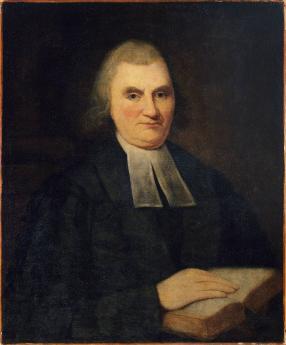
|
| Dr. Witherspoon |
The most eminent Scotsman in Colonial America was the Reverend Dr. Witherspoon, an eminent Presbyterian minister and President of the College of New Jersey, later Princeton University. Already at the top of the academic heap in Scotland, he was recruited for Princeton on the advice of Benjamin Franklin, who knew his political sentiments well. From England, Witherspoon made the following exhortation to his future compatriots at the critical moment of the Declaration of Independence:
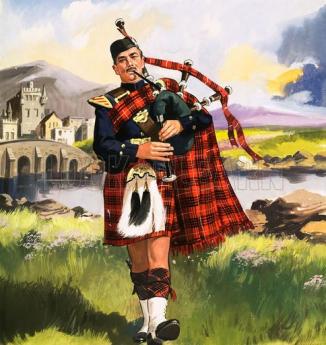
|
| Scottish Pipers |
"To hesitate at this moment is to consent to our own slavery. The noble instrument on your table, which insures immortality to its author, should be subscribed this very morning by every pen in this house. He who will not respond to its accents and strain every nerve to carry into effect its provisions is unworthy the name of freeman. Whatever I may have of property or reputation is staked on the issue of this contest; and although these gray hairs must descend into the sepulcher, I would infinitely rather that they descend hither by the hand of the executioner than desert at this crisis the sacred cause of my country."
On the humbler level of popular doggerel, was the following:
"And when the days of trial came,
Of which we know the story,
No Erin son of Scotia's blood
Was ever found a Tory. "
It may not be quite true that the Scotch-Irish immigrants started the Revolution, or led it, or did most of the serious fighting. But in Pennsylvania their role was decisive. New England started most of the trouble, the aristocrats of Virginia quickly rose to the challenges of chivalry, but Pennsylvania was not so darned sure about this business. The back-country Germans were perfectly content to farm the richest topsoil they ever heard of, the Quakers were peaceful and prosperous just as they were. It was the Scotch-Irish of the frontier, needing no pretext of Tea Taxes or Stamp Acts to hate the English King, who were ready to take the musket off the wall at the slightest provocation.
It is indeed puzzling in retrospect to wonder what the English Kings were trying to achieve. Having driven the Scots out of their Scottish homeland into Ireland where they would be less bother, they subsequently drove them out of Ireland as well. The short explanation has been offered that James II who was to be driven off the throne for his Catholic leanings, had seen Ireland as a fall-back refuge in case of trouble and wanted it safely Catholic. So in anticipation of what did indeed happen under William and Mary, he wanted the Presbyterians out of there.
There is perhaps some logic to this, but try telling it to a Scot.
Newburgh NY: Washington Slept Here

|
| Newburgh, NY |
A silhouette map of the Hudson River from top to bottom shows several stretches of narrow river between several other wide stretches, almost like lakes. The narrows reflect the places where mountain ranges broke apart to let the river through, and the lakes are places where the water backed up until it got high enough to flow through the gorges. There's not much water pressure since the Hudson at the mouth of the river at New York Bay is only a few feet deeper than it is at Albany. Ben Franklin was the first to observe that the Hudson and Delaware are not exactly rivers; they are more like fjords, tidal up to Poughkeepsie and Marcus Hook, respectively. The Dutch had a settlement at New Amsterdam, of course, but there was another settlement around the Tappan Zee, and another cluster above West Point. Kingston was the dominant town of this upper settlement, but the British had burned it to the ground after their defeat at Saratoga in 1777. In 1782, Washington chose Newburgh to be his headquarters, where he remained for 16 months, the longest headquarters interval during the eight-year guerilla war.
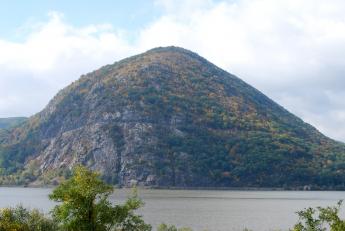
|
| Storm King Mountain |
As always, Washington made excellent use of geography. The Storm King Mountain and West Point to its south narrowed the water route to New York down to a defensible defile. On the east side of the Hudson, the towering ridge not only protected the encampment from surprise but provided a lookout point at Beacon, where television towers now stand. The land is broken and semi-mountainous on the east side of the Hudson, all the way into Connecticut; an extension of difficult terrain which on the south crosses the Hudson and extends west into New Jersey. Reduced to its essentials, the British in New York and Washington in Newburgh were separated by a mountain range with a Hudson River water gap running through it. Immediately to the west beyond Newburgh however, the land is fairly flat until it rises to the watershed of Delaware. Washington could defend the Hudson against the British Navy at the narrows, eventually blocking the channel with a chain which was sufficient barrier to sailing vessels if they were vulnerable to cannon fire from the shore. If there was a land attack sweeping around behind Newburgh, Washington could escape by sailing up the Hudson; in that case, he would have boats and the pursuing British Army wouldn't. Such a daunting natural fortress was adequate for his situation since the British were equally reluctant to sustain casualties in frontal assaults so late in the war unless victory was fairly quick and easy. This was the general issue underlying the Benedict Arnold affair: blocking the British Navy from making a landing north of the watergap.
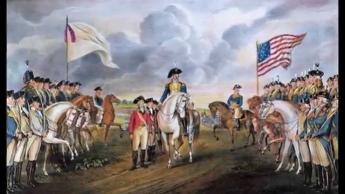
|
| Battle of Yorktown |
After the battle of Yorktown, the British could see there was no hope of subjugating large colonies using armies mostly supplied by sea. The Revolution settled down to attrition at sea, but the American privateers were winning that, too. Eventually, more British were lost to privateering than to warfare on land. The colonies were learning how to supply themselves with manufacturers, while the British were losing substantial amounts of trade with other parts of the Empire. Franklin in Paris was counting on Washington to maintain a credible threat; Washington was counting on Franklin to drive a hard bargain, but hurry up, please, our troops haven't been paid and are restless. The privateers were both suffering and inflicting appalling losses at sea, but their owners were getting rich. Most of the early great fortunes of Federalist America trace their origin to privateering. All of these emerging realities presented a bleak future to the British, and Franklin was masterful in rubbing it in. But if Washington lost control of his little army, a great deal more would be lost at the treaty negotiations.
Washington's Circular Letters
ONCE Cornwallis surrendered to Washington at Yorktown in 1781, there emerged the usual reluctance of troops on both sides to get killed for a dispute that was already settled. The British monarchy had ample experience with wars and fully expected to exploit this trait of exhausted soldiers at the end of one. It was clear to the British the colonies could neither be reconciled nor forcibly subdued. What was not clear was how much national advantage might still be extracted from a peace conference. Bluffs and intransigence might still achieve what bayonets could not. Seasoned diplomats are accustomed to such manipulation, but the new American nation only had Benjamin Franklin grown equal to it, representing Pennsylvania and Massachusetts with the British Ministry for several years. Beyond that, however, a particularly American trait was emerging to quit the game before the last card is played. During the Nineteenth century, anticipating and resisting that irresolute temptation came to be called, Character.
The American Revolutionary Army was seldom well-fed, never well armed. Hardly anyone expected a war lasting eight years, or the British regulars to be so mean and effective. Major General Benedict Arnold had seemed like our perfect soldier but turned traitor while in charge of a major defense position at West Point, New York. Conditions for wives and children at home were bad. And the Congress in Philadelphia was willing to inflate the currency, hold back soldiers' pay, pinch pennies on supplies. Other colonies frequently promised to send more soldiers than they actually supplied. Not that they were proud of themselves; they skulked. Surely, some state legislatures and representatives were better than others, but they are almost impossible to identify, now. They all must have been somewhat complicit, or we would have heard more of them denouncing each other. It must have been supremely painful for Washington to receive promises of troops and supplies that he privately doubted, and then to be obliged to assure his troop's help was forthcoming. Inevitable disillusionment discredited him more than the Governors who put him in that position. The British troops surely shared their enemy's reluctance to get killed for a war that was over. They partied and roistered in New York, but who knows what general in London might suddenly order an attack on Washington at Newburgh, just to make overall British defeat seem less humiliating.

|
| Headquarters, Newburgh NY |
During sixteen months of this agony, Washington wrote many letters to state Governors, keeping them informed while asking for their help. The custodians of the Headquarters museum proudly show the various tables and chairs for his aides to translate French and Spanish, to make thirteen copies of just about everything, and careful files of all correspondence. Washington was an organized person, they say, or else his chief of staff was organized. Someone like Alexander Hamilton, perhaps. Out of all this headquarters communication system gradually emerged the system of Circulars. The General was in a position to see huge deficiencies in the government system for which he dedicated his life, and apparently grew haunted by the idea that all this suffering would be for nothing if the government which emerged was anything like what he was now seeing. His Circulars to the governors began to take on the style of outlining what kind of government the United States ought to have. It must, for example, acquire federal power; the states must turn over more of their own power to the decisions of a single executive. It must pay its debts; a mighty nation does not chisel its creditors. It must suppress the inclination to squabble and think the worst of one another. It must, in his phrase, be virtuous.
Two emphatic views of the new country emerged from Washington's time in Newburgh. The inability of the government to pay its soldiers, suffering or no suffering, was particularly agonizing. And the close call he had with threatened mutiny made it much worse. Robert Morris had run out of tricks and instructed him the central issue was for the Federal government to be able to levy taxes for servicing the debt, which would make it possible to borrow still more through leverage. Washington never forgot this episode, and at several points, during his later presidency, it guided him well. The other episode which made a lasting impression was to some degree his own fault. He was so impassioned in his hatred of monarchy that his closest friends, Hamilton and the two Morrises -- who had never seen much to criticize in a monarchy -- essentially gave up on trying to persuade him, and took the side of General Gates the hero of Saratoga in a planned mutiny. Washington put it down with nothing but the power of his personality and a little play-acting with his bifocals, but he almost lost the confrontation in an instant. Washington had many close calls with death on the battlefield, but these two near-defeats pretty much shaped the rest of his life as our first President. Indeed these two hatreds, of debt and monarchy, continue to characterize many Americans to a degree that others would describe as unreasonable.
And then he made a mistake. As a way of proving his lack of personal motive, he announced in advance he would be leaving public service forever. Today, every lame duck knows that's a bad idea, even when you mean it. And while he may have sincerely thought he meant it at the time, events show he really didn't. Although he probably didn't want to be indispensable, circumstances made him so. He discovered how little he knew of the technical details of government, and thus how much he needed James Madison's help. Washington lacked skill in managing finance; having depended on Robert Morris throughout the war, he needed Alexander Hamilton at least to handle a peaceful economy. But there was no running away from the central issue; he would be forced to recognize how much he overshadowed anyone else in demeanor, and so, how unlikely it was that anyone else could bully others into cooperating. He was a great-souled person, in Aristotle's phrase. Franklin alone perhaps understood and privately doubted that even Washington could pull it off. Washington's Circulars were driving him straight toward seeking the Presidency he widely proclaimed he did not want and would not accept. And thereby he threatened the one thing in life he prized more than any other: his word of honor to keep his promises.
| Posted by: Daniel Paine | Apr 11, 2011 12:18 AM |
my mother was a Carey and Carey"s played a long and daring role in this time of our history. If you or any one have info on my lineage pleace notify me of this ancestry importance to us . Thankyou Ty Stumpf & family
| Posted by: Ty Stumpf | Jun 21, 2010 9:37 PM |
| Posted by: George Fisher | Apr 23, 2008 12:50 PM |
| Posted by: George Fisher | Apr 23, 2008 12:40 PM |
Georgetta Potoski, President,
Plymouth (PA) Historical Society
| Posted by: Georgetta Potoski | Apr 23, 2008 7:12 AM |
| Posted by: veronica | Apr 10, 2008 7:30 PM |
12 Blogs
The Origin of States Rights, a Rumination
The clamor for States Rights probably began with Virginia's claims for western territories.
Designing the Convention
 To understand the original intent of the Constitution, it helps to see it in three parts. The part Washington and Madison devised in 1787 was mostly about structure, the main goal of which was to lay out certain national functions which the federal government could perform without state interference. That's delicate diplomacy because the states had to ratify it.
To understand the original intent of the Constitution, it helps to see it in three parts. The part Washington and Madison devised in 1787 was mostly about structure, the main goal of which was to lay out certain national functions which the federal government could perform without state interference. That's delicate diplomacy because the states had to ratify it.
Articles of Confederation: Flaws
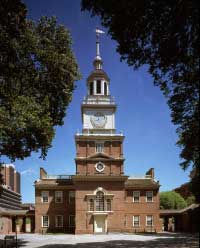 Some subtle features make the Constitution a vast improvement over the Articles of Confederation.
Some subtle features make the Constitution a vast improvement over the Articles of Confederation.
The King's Last and Final Word
 King Charles II did give Wilkes-Barre to Connecticut first, and the same king did later give the same land to William Penn. Unfortunately for Connecticut, at that time the last word was all that mattered.
King Charles II did give Wilkes-Barre to Connecticut first, and the same king did later give the same land to William Penn. Unfortunately for Connecticut, at that time the last word was all that mattered.
Pennsylvania Likes Private Property Private
 The King used to own the whole country. William Penn got us used to the idea that my property is mine, not the King's.
The King used to own the whole country. William Penn got us used to the idea that my property is mine, not the King's.
The Heirs of William Penn
 The death of William Penn left his heirs the largest land holdings in America. Although they managed it fairly well, it proved to be more than a single family could cope with.
The death of William Penn left his heirs the largest land holdings in America. Although they managed it fairly well, it proved to be more than a single family could cope with.
East Jersey's Decline and Fall
 Some day, a novelist will make East Jersey famous. There's lots of material there.
Some day, a novelist will make East Jersey famous. There's lots of material there.
Addressing The Proprietors' Dilemma
 King Charles II gave Pennsylvania to William Penn on condition he defends the place and fuss with neighboring states about its boundaries. A century later, it proved more than a private citizen could handle.
King Charles II gave Pennsylvania to William Penn on condition he defends the place and fuss with neighboring states about its boundaries. A century later, it proved more than a private citizen could handle.
Dingman's Ferry, Below Port Jervis
 The northeastern corner of Pennsylvania has a deep gorge for the Delaware River. Just south of it, the river narrows to a crossing at Dingman's Ferry, now occupied by Dingman's Bridge.
The northeastern corner of Pennsylvania has a deep gorge for the Delaware River. Just south of it, the river narrows to a crossing at Dingman's Ferry, now occupied by Dingman's Bridge.
The Scotch-Irish In the Revolution
 English Quakers and Rhineland Germans were eternally grateful to the British Monarch for offering them an American refuge. By contrast, the Scotch-Irish, although energetic frontiersmen, harbored lasting resentment against the English Kings who had driven them here.
English Quakers and Rhineland Germans were eternally grateful to the British Monarch for offering them an American refuge. By contrast, the Scotch-Irish, although energetic frontiersmen, harbored lasting resentment against the English Kings who had driven them here.
Newburgh NY: Washington Slept Here
 After the battle of Yorktown the British knew they were beaten, but still stationed a menacing army in New York. Upriver at Newburgh, Washington struggled to keep his own army from deserting.
After the battle of Yorktown the British knew they were beaten, but still stationed a menacing army in New York. Upriver at Newburgh, Washington struggled to keep his own army from deserting.
Washington's Circular Letters
 During the dismal days of 1782-3, Washington was confronted with the first of many examples of the American tendency to quit a war before it is completely won.
During the dismal days of 1782-3, Washington was confronted with the first of many examples of the American tendency to quit a war before it is completely won.